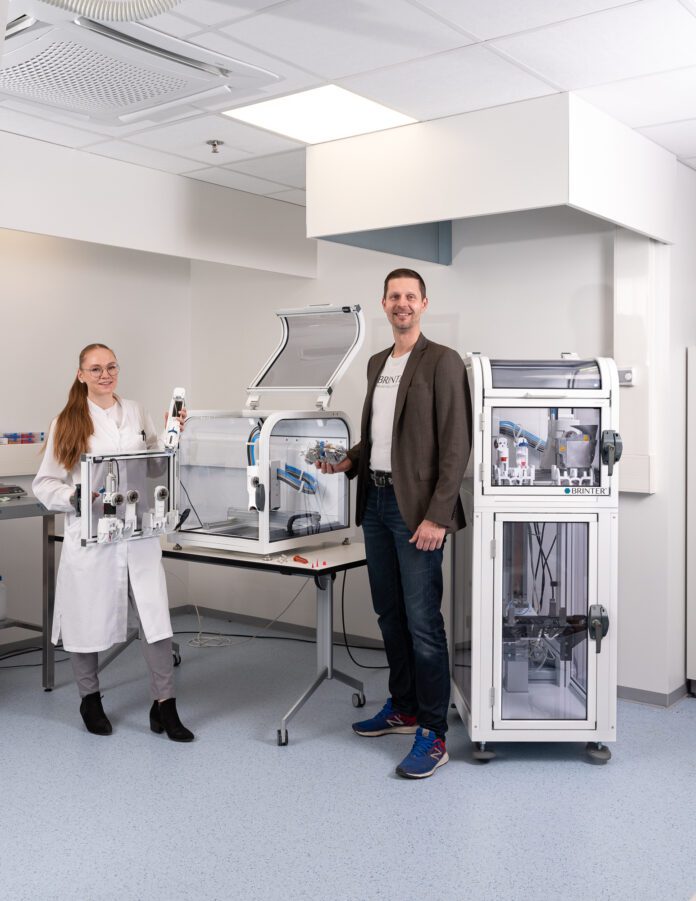
Brinter raises €1.2M in seed funding to accelerate 3D printing bioscience research and manufacturing for uses that range from personalized drugs to human spare parts
Turku, Finland (June 10th, 2021) Turku-based bioprinting startup Brinter has today announced the successful closure of a €1.2M seed funding round led by early-stage VC Innovestor. The company will use the capital to further expand its operations internationally in Europe and the US. Brinter aims to put bioprinting within reach of every pharmaceutical company, hospital, university, and research center.
Medical research facilities and universities often still rely on traditional methods of discovery in the research of new drugs, understanding diseases, and finding medical ways to help people. Brinter’s modular multi-material 3D bioprinting solution offers a premium yet cost-effective approach to shorten and enhance the productivity of the scientific discovery process and bio-manufacturing. In addition, it is a solution that easily scales as technologies develop.
Brinter aims to remove technology as a limitation to improving our quality of life. The company also seeks to save more lives through more personalized treatment and the production of “spare parts” such as hearts and kidneys.
“We are excited to have the backing of Innovestor who can help us accelerate the development of our operational capabilities and scale in new geographies,” says Brinter CEO Tomi Kalpio.
“Bioprinting has the capability to rapidly unlock the opportunities behind long-running but unrealized science and research, and plays a key role in pushing the frontier of medical science. This will result in an improved quality of life for patients through the expansion of more personalized treatment and the ongoing development of bioprinted “spare parts” that can save lives,” he explains.
The market is growing strongly as accelerated technological, material, and methodological developments expand the potential applications for 3D-bioprinting. Brinter can speed up this scientific development by a factor of up to ten.
“Companies like Brinter are paving the way for 3D bioprinting, revolutionizing the future of medicine to the point where a customized heart or kidney can be made for a transplant patient. We are very excited to be a part of Brinter’s journey!” says Wilhelm Lindholm, CEO of Innovestor.
“Brinter is an exciting addition to our portfolio as it not only fits in our focus areas of industrial and health technologies, but the company’s competitive advantages of multi-material printing capabilities, modularity, and scalability combined with their own easy-to-use software application were very convincing,” concludes Lindholm.
Customers of the company include bio and pharmaceutical companies like Nanoform, as well as research organizations like VTT, BEST group at the University of Glasgow, Johannes Gutenberg University of Mainz, the University of Oulu, and the University of Helsinki.
“The printing of a new kidney for a transplant patient from programmed stem cells is a highly promising opportunity and could be realized already within this decade,” estimates Professor of Developmental Biology and Research Director of the Kvantum Institute Seppo Vainio from the University of Oulu. “There is a worldwide need for kidney transplants due to the rising incidence of diabetes, for example. Even the COVID-19 disease can lead to acute kidney failure, so there’s a great need for printed organ transplants and we look forward to the achievements that we will be able to reach using Brinter,” explains Vainio.
“I am extremely excited to continue our 3D brain printing project with Brinter. The brain is an extremely vulnerable organ and target of various incurable diseases with the highest societal impact. Combined with two other rapidly-developing technologies – stem cells and biomaterials – 3D-bioprinting will soon provide us with fine-tuned human mini-brains and brain prosthetics, thereby deepening our understanding of the human mind and our ability to combat serious brain disorders,” comments Jari Koistinaho, MD, Ph.D., Professor of Regenerative Medicine, University of Eastern Finland and Director of Neuroscience Center & Professor of Neuropharmacology at the University of Helsinki.
Brinter has bootstrapped its growth since 2019, when it launched its first product and is currently active in over 10 countries, including Germany and the UK.
###

| [donate]
| Help keep news FREE for our readersSupporting your local community newspaper/online news outlet is crucial now more than ever. If you believe in independent journalism,then consider making a valuable contribution by making a one-time or monthly donation. We operate in rural areas where providing unbiased news can be challenging. |



















